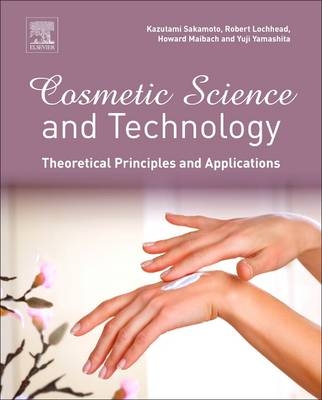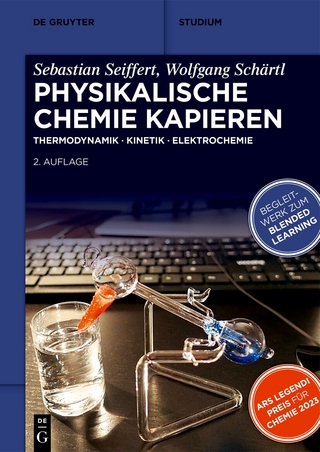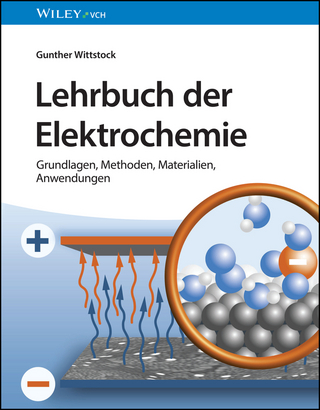
Cosmetic Science and Technology: Theoretical Principles and Applications
Elsevier Science Publishing Co Inc (Verlag)
978-0-12-802005-0 (ISBN)
- Titel erscheint in neuer Auflage
- Artikel merken
As the cosmetics field quickly applies cutting-edge research to high value commercial products that have a large impact in our lives and on the world's economy, this book is an indispensable source of information that is ideal for experienced researchers and scientists, as well as non-scientists who want to learn more about this topic on an introductory level.
Kazutami Sakamoto is a Guest Professor at the Department of Pure & Applied Chemistry, Faculty of Science & Technology, at Tokyo University of Science (TUS), Japan and former professor of Faculty of Pharmacy at Chiba Institute of Science (CIS), Japan. He is a Fellow of the Chemical Society of Japan and was a Chairman of Division of Colloid and Surface Chemistry at The Chemical Society of Japan for 2007-2008. In these capacities he conducts fundamental research in the field of cosmetic science. He has 37 years of industrial carrier for the R&D and international marketing of cosmetic ingredients and products at Ajinomoto Co., Inc. (33 years), Shiseido Res. Cent. (3 years), and Seiwa Kasei (2 years). As well as working in industry, Dr Sakamoto has been active in research and educations at Universities as Yokohama National University, Shinsyu University then Tokyo University of Science as an adjunct professor. After retiring from industry in 2008, he has been expanding academic activities. His study “Self-Organization of Amino Acid Based Chiral Surfactants: Evaluation of Organized Structures and Interactions with Biological System was awarded by Japan Oils Chemists’ Society in 2005. He has been actively participating in many international conferences as an invited speaker over the past decade and more. Robert Y. Lochhead is Professor and Director Emeritus of Polymer Science and High-Performance Materials at the University of Southern Mississippi, USA. Following a 25-year career with I.C.I., Unilever, and BF Goodrich, Bob Joined academia and served as Professor, Chair and Director of the School of Polymers and High-Performance Materials at the University of Southern Mississippi. After retirement from the university in 2016, Bob founded Robert Lochhead Consulting LLC. Bob has served twice as the President of the SCC, and as President of the International Association of Formulation Chemists. Bob is a fellow of the SCC and a Fellow of the Royal Society of Chemistry. Among other honors, he is a recipient of the SCC’s Maison G. DeNavarre Medal Award, the SCC’S Merit Award, the AIC’s Chemical Pioneer Award, and the Society of Plastics Engineers’ Education Award. ?Bob received the SCC’s Lifetime Service Award in December 2019 and was named one of the first three Fellows of the IFSCC in 2020. Howard Maibach is a Professor at the Department of Dermatology at UCSF, USA. He is an expert in contact and occupational dermatitis and sees patients at the Environmental Dermatosis Clinic, which is part of the Dermatology Clinic. His specialty is dermatotoxicology, or skin exposure toxicity; allergies and skin disorders; and dermatopharmacology or the study of medications for skin disorders. Maibach has been on the editorial board of more than 30 scientific journals and is a member of 19 professional societies including the American Academy of Dermatology, San Francisco Dermatological Society, and the Internal Commission on Occupation Health. His current research programs include defining the chemical-biologic faces of irritant dermatitis and the study of percutaneous penetration. When Dr Maibach is not in the lab conducting research or in the classroom teaching, he is seeing patients at the Environmental Dermatoses Clinic (of the Dermatology Clinic), mostly providing second opinions on allergic contact dermatitis. Yuji Yamashita is an Associate Professor at the Faculty of Pharmacy, Chiba Institute of Science (CIS), Japan. He received his Ph.D. in natural science from Bayreuth University, Germany, in 2005, plus an M. S. and B. S. from Yokohama National University, Japan. After several years of research work on the thermotropic liquid crystals in industry laboratory at Chisso Petrochemical Co., Japan, he began to study dermatology, especially transdermal drug delivery system, as a post-doc at St. Marianna University, Japan. Since October 2011, he has been engaged in teaching and research concerning cosmetic science as an assistant professor at Chiba Institute of Science, Japan. The area of his expertise is the surfactant science such as phase behavior and self-assembly which is related to formulation technology.
Part I. General View of Cosmetic Science and Technology 1. General Aspects of Cosmetics in Relation to Science and Society: Social, Cultural, Science, and Marketing Aspects 2. Global Cosmetic R&D Trends Unveiled From Past IFSCC Award-Winning Papers 3. Basic Physical Sciences for the Formulation of Cosmetic Products 4. Scouting to Meet Unmet Needs 5. New Aspects of Cosmetics and Cosmetic Science 6. Psychology of Cosmetic Behavior 7. Dermatological Benefits of Cosmetics 8. Development of Cosmetics and Intellectual Property Rights 9. Regulations on Cosmetics
Part II. Fundamental Resources for Cosmetics 10. Introduction to Cosmetic Materials 11. Nomenclature of Ingredients 12. Water 13. The Use of Polymers in Cosmetic Products 14. Powders and Inorganic Materials 15. Surfactants 16. Emollients 17. Bioactive Ingredients: Benefits of Cosmetics Stimulated Through Biological Aspects 18. Fragrance 19. Amino Acids, Peptides, and Proteins 20. Botanical Ingredients 21. Functional Materials for Hair 22. Nanotechnology in Cosmetics
Part III. Physicochemical Aspects and Formulations 23. Wetting and Surface Characterization 24. Molecular Structure and Phase Behavior of Surfactants 25. Lamellar Gel Network 26. Polymer–Surfactant Interactions 27. Rheology of Cosmetic Formulations 28. Emulsion and Emulsification Technology 29. Microemulsions and Nano-emulsions for Cosmetic Applications 30. Effect of Molecular Assembly for Emulsion and Gel Formulations 31. Liposomes for Cosmetics 32. Skin Care Cosmetics 33. Body Care Cosmetics 34. Makeup Cosmetics 35. Ultraviolet Care Cosmetics 36. Hair Care Cosmetics 37. Sensory Measurement—Evaluation and Testing of Cosmetic Products 38. Structural Analysis of Formulations 39. Increasing Productivity by Reducing Carbon Footprint in Cosmetics Processing
Part IV. Physiological and Dermatological Aspects 40. Structure and Function of Skin From a Cosmetic Aspect 41. Skin Lipids 42. Structural Aspects of Stratum Corneum 43. Skin Aging 44. Melanogenesis 45. Sensitive Skin 46. Skin Penetration 47. Effects of Air Pollution on Skin: Dermatologic Options 48. Hair Physiology (Hair Growth, Alopecia, Scalp Treatment, etc.) 49. Clinical Evaluation and Instrumental Techniques in Dermatology 50. Safety Evaluation 51. Safety Assessment of Cosmetic Ingredients
| Erscheinungsdatum | 31.03.2017 |
|---|---|
| Sprache | englisch |
| Maße | 216 x 276 mm |
| Gewicht | 2630 g |
| Themenwelt | Naturwissenschaften ► Chemie ► Physikalische Chemie |
| Technik | |
| Wirtschaft | |
| ISBN-10 | 0-12-802005-9 / 0128020059 |
| ISBN-13 | 978-0-12-802005-0 / 9780128020050 |
| Zustand | Neuware |
| Informationen gemäß Produktsicherheitsverordnung (GPSR) | |
| Haben Sie eine Frage zum Produkt? |
aus dem Bereich



